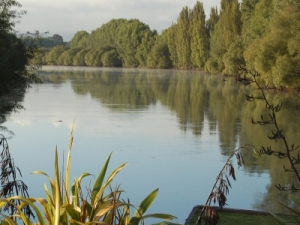DairyNZ Levy Vote Underway as Chair Highlights Seven-Fold Return
Voting has started for the renewal of DairyNZ's milksolids levy.
 The Waikato River Authority is contributing $828,000 in its latest funding round towards the development and implementation of the Waikato-Waipa restoration strategy.
The Waikato River Authority is contributing $828,000 in its latest funding round towards the development and implementation of the Waikato-Waipa restoration strategy.
The Waikato River Authority is contributing $828,000 in its latest funding round towards the development and implementation of the Waikato-Waipa restoration strategy.
The strategy is a partnership between DairyNZ, the Waikato River Authority and Waikato Regional Council, and will provide a framework for all organisations involved in Waikato and Waipa River catchment restoration activities.
Waikato Regional Council-linked environmental protection and restoration projects have attracted more than $1.3 million in Waikato River Authority contributions in the latest funding round announced recently.
"This is a real vote of confidence in this work we're doing in co-operation with iwi, community groups and landowners outside the scope of the council's core business-as-usual work," said council chairperson Paula Southgate.
"I'm very grateful for the funding and the very co-operative relationship we have with the authority when it comes to protecting and restoring the Waikato and Waipa rivers."
Other projects being funded include:
· Just under $345,000 for the Mangaotama wetland restoration project to undertake weed control, fencing, planting and pest control on an ecologically significant 27ha wetland near Ngahinapouri
· $85,000 for Lake Otamatearoa and Parkinson's Lake restoration, involving fencing and planting of 20,000 native plants around dune lakes near Waiuku
· $34,000 for the Lake Waikare northern foreshore enhancement which is includes planting 10,000 plants for wetland enhancement
· $32,000 for Mangapu River riparian restoration project which involves native planting of 2.5 kilometres of river margin near Te Kuiti.
"This approach to supporting such projects is assisting iwi trusts, marae, community groups, private landowners and others to undertake restoration works and build their knowledge and capacity," says Southgate.
Agrisea NZ has appointed Craig Hudson as it's new chief growth officer.
State farmer Landcorp, trading as Pamu, is a forecasting a full-year net profit of around $100 million.
Tony Aitken, chief executive of Ruralco, has been awarded the Excellence in Business Leadership Award at the ANZ Business of the Year Awards.
Global trade has been thrown into another bout of uncertainty following the overnight ruling by US Supreme Court, striking down President Donald Trump's decision to impose additional tariffs on trading partners.
Controls on the movement of fruit and vegetables in the Auckland suburb of Mt Roskill have been lifted.
Fonterra farmer shareholders and unit holders are in line for another payment in April.

OPINION: Here w go: the election date is set for November 7 and the politicians are out of the gate…
OPINION: ECan data was released a few days ago showing Canterbury farmers have made “giant strides on environmental performance”.